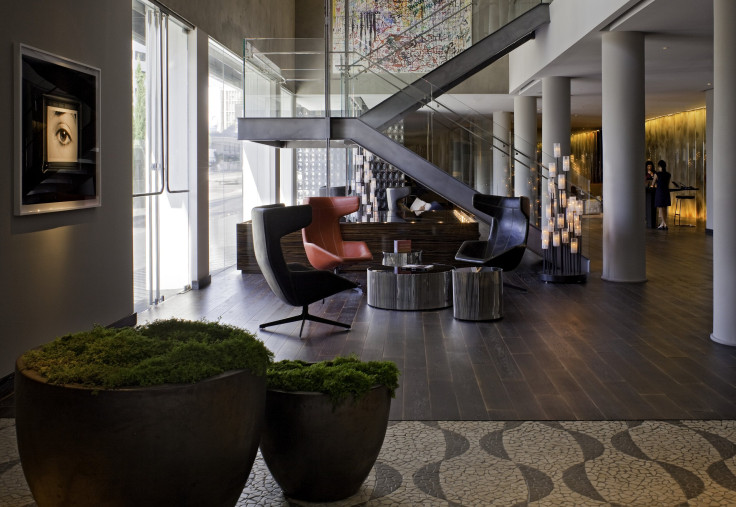Major Hotel Brands Compete For Space In The Boutique Hotel Trend
Rise Of The Big-Box Boutique

In an age when you can’t go on vacation without documenting (and let’s face it, bragging about) your trip on Instagram, Facebook and Twitter, travelers are desperate for a unique, "my friends won’t believe this" experience. And where you stay on that vacation is an essential part of crafting the perfectly shareable narrative. The Internet has also made it easier to research other travelers' experiences ahead of time, easing the fear of the unknown that vacationers may have had in decades past.
As a result, growth in boutique hotels, defined as upscale, smaller properties focused on design, technology, local culture and standing out from the cookie-cutter hotel crowd, has exploded in the last decade. According to research firm IBISWorld, the boutique hotel industry, which comprises about five percent of the market, has grown 6.1 percent per year since 2009, and it expects that growth to accelerate through 2019.
“Starting in the 1950s, standardization became a plus in hotels. Travelers would know what to expect when they would visit a city they had never been to before,” said Bjorn Hanson, professor at NYU’s Center for Hospitality and Tourism. “In the last decade, that trend has reversed. All of a sudden, standardization has become a negative. Guests are looking for experiential travel -- something that will look cool in an Instagram photo.”
It’s no surprise then that giant hotel chains such as Marriott, Hilton and Hyatt want a piece of the boutique hotel action, whether it’s by acquiring existing properties or developing new ones of their own. Earlier this month, InterContinental Hotels Group (IHG), the world’s largest hotel brand, finalized its acquisition of Kimpton, a beloved chain of boutique hotels with a fiercely loyal following. Backlash against the merger from Kimpton fans was swift: Many worried that the deal would result in a homogenization of the quirky, stylish hotels guests have come to love.
“The Kimpton customer is worried, because it’s a beloved brand,” Sean Murphy, editor of members-only luxury travel website Jetsetter, said. “But IHG is smart enough to realize: Don’t mess with the formula. They’re interested in growth and can offer Kimpton opportunities expand in more locations while maintaining its distinct style.”
Whether IHG is successful in its venture with Kimpton remains to be seen, but it’s just one more in a long list of attempts by the big hotel corporations to create “branded boutiques” and capture younger, savvier travelers who value style over standardization. Starwood Hotels was the first to get in on the trend, and its launch of W Hotels in the late 1990s has been a resounding success. Later, Hyatt launched Andaz in 2007, and Hilton announced Canopy in 2014. Marriott went all the way with several collections, including Autograph, Moxy and the most recent Edition chain of hotels that’s the result of Marriott’s unlikely partnership with Ian Schrager, the entrepreneur and hotel impresario who is credited as the pioneer of boutique hotels.
But are branded boutiques antithetical to the concept of boutique hotels themselves? “The brands haven’t been very good at doing boutique because their whole DNA has been about consistency, scale and saving on cost,” Murphy said. “Boutique hotels have a specific mindset -- they’re not mass produced. But everyone can’t stay at a boutique hotel because of room capacity and also because not everyone has the luxury to afford boutique hotel prices. That’s where big brands can carve out a space.” That can also include travelers who want the advantage of earning loyalty points with their preferred brands.
Murphy says that to be successful in the boutique space, they will have to approach their projects with sincerity about offering guests a unique experience. “Some of the brands are just checking off boxes, hoping the cosmetics will attract a customer,” he said. Those are the ones that are likely to flounder in the long run. “Other brands do it well, like Hyatt with Andaz. It gets the details correct. The brand understands the importance of design and space, and even though it’s scalable, it’s attractive to an audience that’s interested in design.”
Still, some critics say the trend is watering down the boutique experience itself. Avi Brosh, founder of Paligroup hotels, addressed the issue at a Skift travel industry conference in October. “What does boutique even mean today? I don’t really know,” he said. “I would suggest that boutique hotels, as they’re known in asset-class capacity, have become spiritually bankrupt.”
Other boutique hoteliers agree. “Large companies, large-scale chains turning themselves into boutiques, are only bastardizing the business in my opinion,” said Paul Ruffino, senior vice president of Kept Hotels & Resorts, at an industry conference in August.
Hanson, who has researched the hospitality industry extensively, predicts that the mainstreaming of boutique hotels will likely just lead to a new innovation in lodging, some of which we’re already seeing with the explosive growth of Airbnb. The home rental marketplace company, for example, could emulate the home stay experience but still adhere to regulatory standards by developing new facilities that feel like homes. “The last innovation that really created incremental demand in lodging was the boutique hotel,” he said. “There hasn’t been anything since.”
Until then, independent boutique hoteliers are confident the big brands will never be able to catch up to what they can offer. “The key to boutique hotels is to bring to life the community and essence of the community in that boutique guest experience,” Tom Griffiths, executive vice president of Worldhotels, said. “I welcome it, because I don’t think they can do what we do for our guests on a boutique or lifestyle level.... You have to be flexible at the local level, and you can’t legislate it at a head office a thousand miles away.”
© Copyright IBTimes 2024. All rights reserved.



















